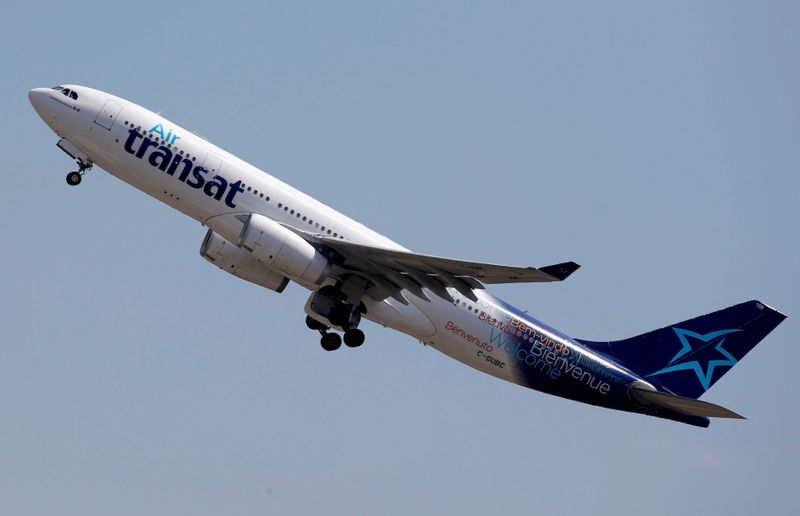By David Ljunggren and Allison Lampert
OTTAWA/MONTREAL (Reuters) - Struggling tour operator Air Transat is in talks with the federal government on aid but may not reach a deal by an April debt deadline, a source close to the situation said, putting pressure on Quebec to ride to the rescue of another troubled aerospace brand in the province.
Air Canada dropped its merger plans with Transat on Friday, saying European regulators had signaled it was unlikely to pass antitrust concerns.
Canada’s largest carrier first bid for Transat in 2019 and discounted its offer last year as the pandemic decimated the travel and tourism sector.
Airlines have been in talks with Ottawa since last year about a possible aid package. Transat’s aborted deal adds fresh urgency to the talks, given the jobs at risk if the carrier fails and the political importance of Quebec ahead of an expected federal election this year.
Transat, which last month suspended flights until June due to pandemic guidelines, has said it needs at least C$500 million in financing this year.
It has obligations due on April 29 for a $50 million revolving facility and a C$250 million short-term loan that matures on June 30. If it does not meet the April 29 requirements, or obtain another extension, creditors could accelerate the repayment obligation.
"There are ongoing negotiations and there is a budget coming up and there is no guarantee at this point that they will get there before the budget," said a source close to the situation, referring to the federal budget slated for April 19.
"I think politically it would be a problem in Quebec. The federal government therefore absolutely has to come up with a solution," the source added, noting that "Transat has more of a cachet in Quebec (than Air Canada)."
Both airlines are Montreal-based but Air Canada originated in Winnipeg before moving its headquarters to Quebec in the 1940s. Transat was founded by a group of Quebec businessmen, including the province’s current premier, in 1986 and grew to become the country’s third-biggest airline.
The airline was "confident we will be able to secure the necessary financing in the coming weeks," spokesman Christophe Hennebelle said on Sunday, reiterating it was at an "advanced stage" of discussions with Ottawa on sector aid and accessing specific pandemic-aid to businesses.
Asked about the status of government talks with Transat, a spokeswoman for Canada’s finance minister said: "I can’t speak to which creditors or lines of financing Air Transat is pursuing. As a private company, they’d be best placed to answer that."
Ottawa said on Friday that protecting jobs and securing the long-term viability of Transat were a priority for the government. The carrier employs 5,000 people, mostly in Quebec, home to much of Canada’s aerospace sector.
'COLLECTIVE INTEREST'
The survival of Transat, its Montreal headquarters and employees puts significant pressure on the Quebec government to secure its future.
Quebec has come to the aid of struggling aerospace companies before. In 2015, the previous provincial government sunk US$1 billion into planemaker Bombardier’s then-struggling CSeries program. Two years later, Airbus paid Bombardier (OTC:BDRBF) one dollar for control of the commercial jet program.
"The Quebec government is caught between a rock and a hard place on this one," said John Gradek, a former airline executive and program coordinator at McGill University's aviation management program.
"There will be a lot of pressure on (Premier Francois) Legault to come to (Quebec businessman) Pierre Karl Péladeau’s aid in terms of funding."
Péladeau, who proposed buying Transat for $5 a share, said on Friday his offer is still available. Transat had previously said the bid lacked the required level of financing.
Péladeau, chief executive of Quebecor Inc, said in a statement that his offer includes "a rigorous business plan focusing on areas of the company with high growth potential, on expertise and job creation in Quebec” and a continued Montreal head office.
A second source familiar with the matter said Péladeau’s offer did not call for funding from the Quebec government, which said in February it was looking at scenarios for Transat "with or without Air Canada."
A spokesman for Quebec’s economy minister declined comment on Sunday.
The separatist Bloc Quebecois said it wanted to ensure Quebec ownership would be favored for the carrier and blamed Ottawa, which approved the merger in February, for delaying an airline aid package.
"Air Transat is a flagship that has made Quebecers proud while offering Francophones a career in aviation," BQ transport critic Xavier Barsalou-Duval said in a statement.

"It is in our collective interest that its decision-making center as well as its control remain in Quebec."